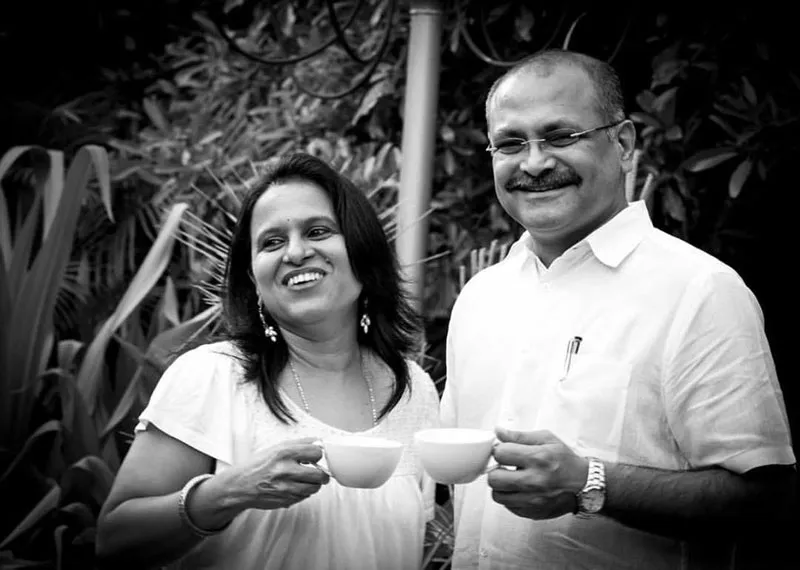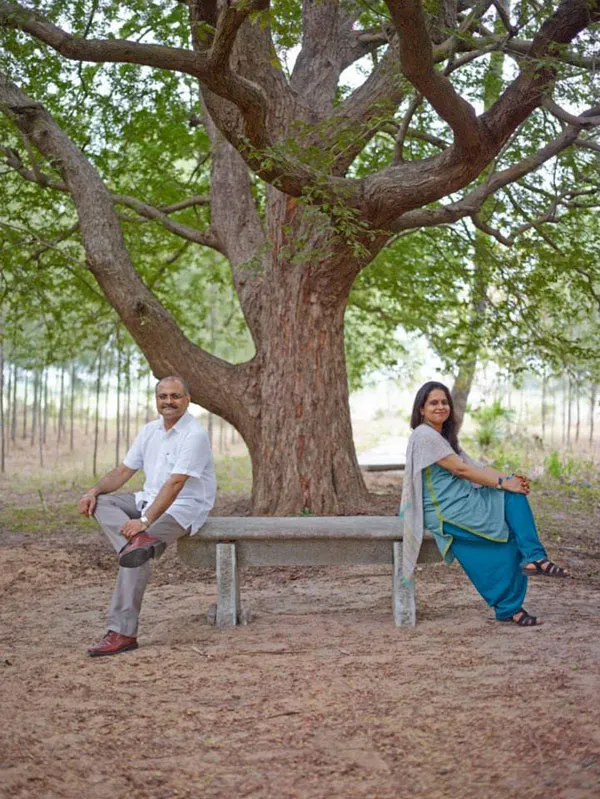How this Chennai couple rose from bankruptcy to create million moments of happiness
If happiness were to be assigned a state of matter, I would imagine it to be liquid. For is it not true that we all drink our share of happiness from our own imaginary cups, bottles, goblets, even saucers -- half full or otherwise? We each look at happiness in a different shape that we have fashioned with our unique experiences of dealing with life’s ups and downs.

This intangible and abstract condition has now come to be valued as a billion-dollar industry worldwide, encompassing the self-help, wellness, and the positive psychology industry. There are many out there peddling happiness as a commodity mostly in the form of self-help books. Countries are looking at calibrating their growth and economic progress using it as a metrics, with the Kingdom of Bhutan which measures its GNH (Gross National Happiness) as opposed to GDP, being a case in point.
Thus, when I heard about AVIS Viswanathan who referred to himself as a 'happiness curator', I was skeptical. But I soon found out this was like judging a book by its cover.

AVIS and his wife and business partner Vaani experienced bankruptcy when the business they had run successfully for six years from 1996, experienced turbulence from 2002 and finally went down in 2008 leaving them with a humongous burden of a Rs 5-crore debt. In the eight years, the couple has gone through an emotional and personal crisis that very few survive to tell the tale. They have battled legal and criminal persecution, family prejudice, and societal censure to come up with their own paradigm of happiness to learn to be happy despite their circumstances.
Pursuit of happiness
When they decided to tell their story they were opening up to public scrutiny.
“Society often judges people who are going through a financial crisis or failure harshly as opposed to say someone battling a health crisis,”
says Vaani. AVIS writes in his book Fall like a Rose Petal that he authored for his children as a ‘father’s lessons on how to be happy and content while living without money’,
“We discovered that integrity of purpose was more important than money; and wearing your life on your sleeve and facing life is better than running away from it.”
Is money not directly proportional to happiness then? For as much as we may differ on the true meaning of happiness, I bet we all believe that though money may not necessarily buy happiness it is an essential ingredient in the cocktail of happiness. “No,” says AVIS, adding,
“When we started doing more and more stuff within the realm of our joy, a phenomenal amount of abundance started coming in.”
This story is as much about AVIS and Vaani’s loss as it is about the straws of learning they clutched on to, to swim ashore. It is perhaps also a story of all those with an entrepreneurial spirit who set sail on the high sea of life with nothing more than their faith and passion, and perhaps a compass ready to brave any storm.
Calm before the storm
AVIS and Vaani met when he was 19 and she 20. AVIS quit business journalism to move from Bengaluru to Chennai to start his own business in 1996. “We had the best six years running our company that was into total reputation management. It was a new concept. We would work with CEOs to identify their company’s purpose, mission, and value and take it to the shop floor through workshops. The other component of the business was external communication and branding,” AVIS says.

It was more like a boutique consulting firm and their ambition was to see it become global. They already had a Hong Kong-based client which was an important one as 60 percent of their revenues came from that one client.
Around 2002, things took a turn when the time came for renewing the contract with this particular client. “I went to meet them least suspecting that the contract would not be renewed even though we had given them the best service and they were happy with it too,” recalls AVIS. At the meeting, the client instead proposed to buy their company and offered AVIS a job in their Hong Kong office. “I would still have considered the offer had they not made what I call an indecent proposal. They were offering to buy my company at the service value. When I asked them why they were valuing it so low, they said what else can you expect an Indian company to be valued at?” AVIS says he was furious, and he left the meeting rejecting the offer.
“Entrepreneurial prudence is that when your revenues are down, you lay off team members and control costs. But entrepreneurial passion also blinds you to that sense of wisdom,”
he says. They did the opposite choosing to fight this out “together” and until their revenue increased they decided to fund the company with debt finance.
“That was the first big mistake,” says AVIS in hindsight.
“I now realise that Excel sheet mein zindagi nahi banti hai (life does not pan out according to a business plan on an Excel sheet).”
Bomb your company
It had now become what Vaani calls ‘a game for cash’. If earlier they were selective about choosing their clients, now they grabbed even those who wanted just PR and external communication work. “It became a big monster and we were not enjoying it one bit,” she says almost shuddering, recalling the worst phase of their life.
It was on New Year’s Eve in 2004, when the family was on a holiday in Coorg and AVIS says he suddenly realised that he did not want to go back to Chennai. He sat Vaani down and told her about his fears that they had reduced themselves to nothing more than a vanilla PR company.
“There’s this saying if you do not like the culture of your company, bomb it. I simply did not like the culture of my company,”
adds AVIS.
Once he was back home, he prepared a ‘Ctrl, Alt, Del’ document which detailed his strategy for the company. “I decided to refuse PR work totally, and instead said we will focus only on reputation management, and third I finally decided to let go of my large team.” But as he realised these decisions were coming three years too late.
“When we evaluated we had 40 employees, six offices, 38 paying customers and all those 38 were for PR-related work. Which meant that we were bombing our firm,” he says. But they did not know the ramifications of what they were getting into. “We thought there will be a certain path visible to us…” trails off AVIS. Instead, the path turned out to be strewn with landmines.
New happiness paradigm
This was an intense period of emotional upheaval for the couple. AVIS was dogged with feelings of guilt and frustrations. The thought of leading his family into the eye of the storm was killing him. So even as they bombed their company, they retained two offices, one in Bengaluru and another in Chennai, and hired some new team members as the entire old team had quit either upset or angry with him for withholding some of their PF or bonus. “We were still borrowing,” he says, exasperated at his own mistakes. These borrowings were in their personal capacity as banks were not ready to give them a corporate loan.

“It is so important for entrepreneurs to evaluate where their borrowings are from. There was no one to guide us,” he rues. When 2006 dawned, they were literally with zero revenue. AVIS says, “Our entire premise of the Coorg conversation was that I was not happy going back to my old office. So we thought if we can take decisions in the realm of our happiness then why not take these learnings and share with the corporate clients we work with.” This is where their ‘happiness strategy’ came in.
They rebranded themselves as a workplace happiness firm. Luckily, because of their earlier pitches, they signed three multi-national clients paying them top-draw fee. “So the new strategy was working,” he says.
A Kafkaesque nightmare
And then something crazy happened. “As we entered 2007, we had a large amount of money to be paid out as debt servicing and all that remained of what we had earned in 2006 was barely enough to run our family and clear some employee related dues and other statutory dues,” he says. The contract for the companies that had signed up in 2006 was for a calendar year.
AVIS says he had no choice but to go beyond the banks. “I now went to family, friends, and non-conventional financiers.” So 365 days of 2007, AVIS and Vaani were borrowing from ‘Peter’ to pay back ‘Paul’, and at the same time pitching to 185 potential customers, none of whom signed up.
“That is what led us to the cathartic experience on December 31, 2007, when our lawyer friend told us that we were bankrupt. It was the most incredible moment of our lives.”
When 2008 opened, they were left with Rs 2000 and the value of their debt was Rs 5 crore. “My son was finishing his high school and wanted to go abroad for further studies, my daughter was 13 and I could not meet any of her wishes. I did not know where to start from,” says AVIS.
As we know trouble never comes alone; it brings a long trail of troubles along. To make matters worse, AVIS says he was 20 kilos overweight, was addicted to tobacco, and was a diabetic. “Our doctor friend told me only half-jokingly that I would not survive to see 40.” To top this all, there were legal cases filed against him, and some creditors would call threatening to kidnap his daughter. His mother and extended family thought he was a cheat.
“I would go to the bathroom, look into the mirror and cry,”
says AVIS. He was drowning in an emotional cauldron.
At that time, he was ready to do anything to get his family out of this mess. They visited astrologers. He wore different rings in the hope of bringing good luck. “People advised me to get into real estate business, recruiting, even take up a job,” he says adding, “Believe me I tried everything. I even held a job for a year, but when you have so many court cases against you, dealing with them becomes a job in itself,” AVIS says. Vaani, on the other hand, had to look after her father who was diagnosed with cancer.
“That was when I came upon ‘mauna’ where you silence your inner self. I found this quote of Vivekananda's very powerful, which goes something like this: ‘Any man can be calm in sleep or in a cave, but if you can stay calm in the middle of chaos then you’ve found your centre.’ I wanted to be there.”
Empowered by this, AVIS started taking charge of his life. He gave up tobacco, lost 20 kgs in six months and his sugar levels came under control.
“So when the body began to cope and mind began to anchor, a new clarity emerged. We had lost everything. Except for something happening to the four of us there was nothing to lose. I told Vaani from here on let us not compromise on who we are and on our inner joy.”
Resilience is like a Bluetooth
From 2008 to 2012, small projects trickled in. “In 2014, we were struggling like in 2007, but we also realised we were not suffering. We learnt to fight this better and better.”

But when business was still not taking off they decided to flip the paradigm and instead of wanting to be successful they decided to be useful. Slowly, the book was published. Their lawyer friend invited him to speak at different gatherings. “Driven by that sense of purpose, anywhere people were willing to pause and reflect, we would tell them our story and the learnings from it,” says AVIS.
They started offering open public workshops calling it ‘Help yourself to happiness’, first for free and slowly moving on to charge for the workshops. They run, ‘Bliss Catchers’, a series of talks featuring people who had braved odds or given up a life of comfort to follow their bliss.
As AVIS says, something miraculous happened. "As we were doing work that gave us joy, a phenomenal amount of abundance started coming in.” Despite his reservations, he did not come in the way of his son’s decision to study abroad. He had no idea how his fees would be paid, “but every quarter some friend would help us out.” The flat they were living in was Vaani’s twin’s flat and she let them stay there rent-free.
“My brother would ask me, 'how come these miracles only happen to you'? I don’t know really, but we had learnt to let go,”
says AVIS.
Among his 179 creditors, while there are some who are still skeptical, there are others who have kept faith in them. "We continue to have the debt hanging over our heads but we hope to repay everyone someday," he says.
According to AVIS, his learnings from his failures have been tremendous. “We found that we can be resilient. Resilience is like a Bluetooth, you have to activate it. The second was resourcefulness. We also worked how to be non-worrying in the midst of worries. The other, in fact, most important lesson was to accept reality. And this is what happiness is. We may not have the money yet but we are finding ourselves to be extremely useful,” he adds.
Though it sounds trite, but the best lesson from AVIS and Vaani’s life is the importance of love that bound them to overcome misfortune together. Again, an abstract concept. But a way to test the existence of love is to look at it as a gaseous substance – it has the ability to compress under pressure!








